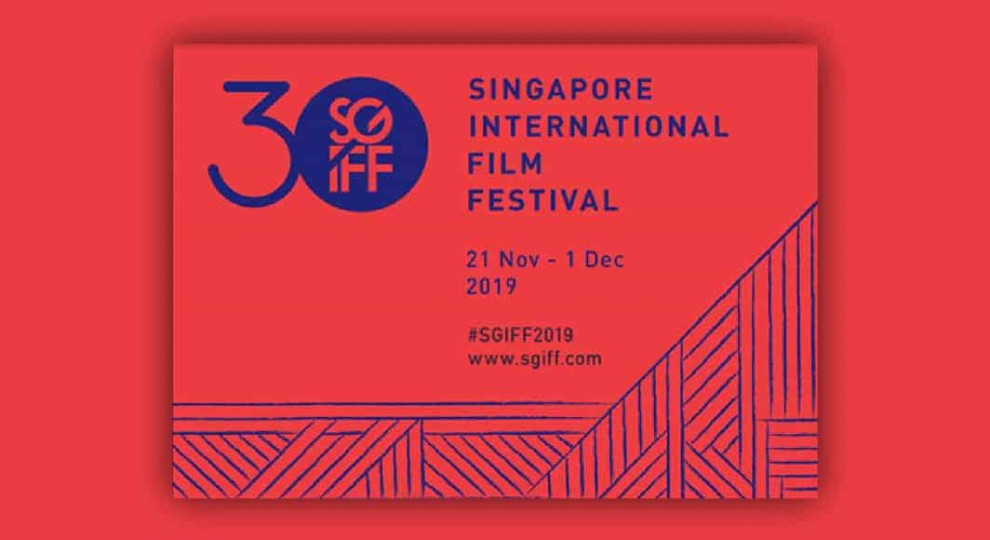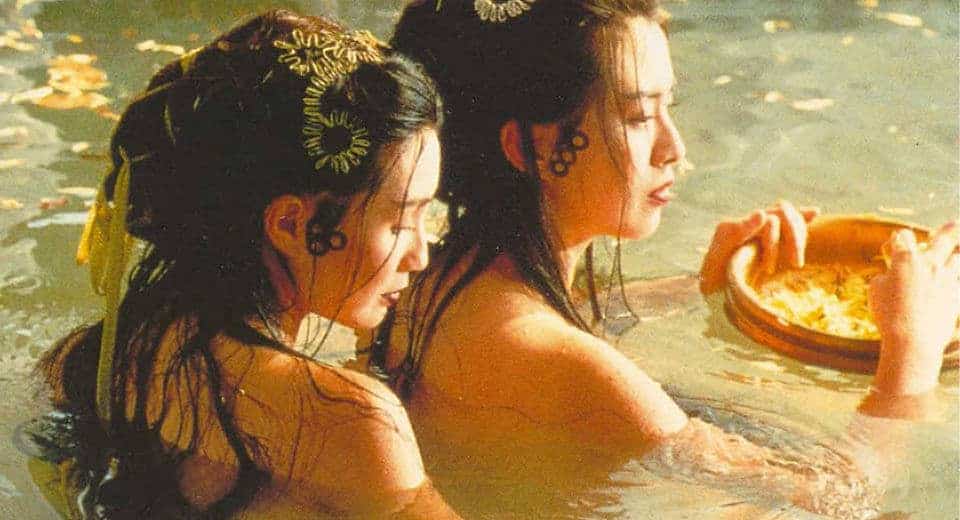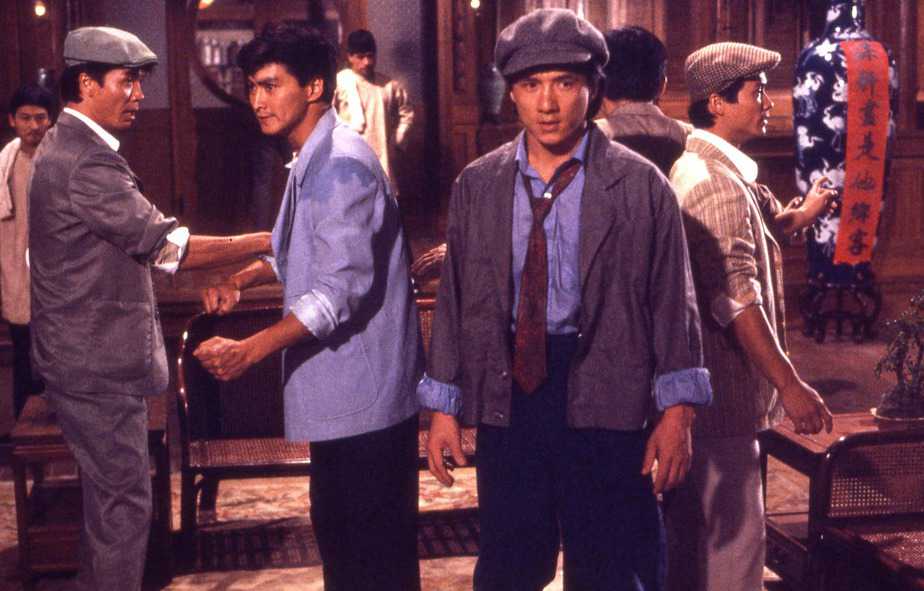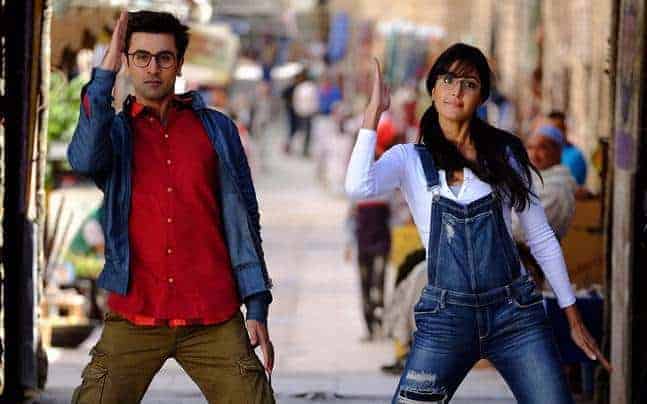A champion of Southeast Asian independent cinema, the Singapore International Film Festival (SGIFF) announced three commissioned short films anchored on the theme of celebration, by Southeast Asian directors Yeo Siew Hua (Singapore), Mouly Surya (Indonesia) and Anucha Boonyawatana (Thailand) today. This is the first commission series for Southeast Asian filmmakers in the history of SGIFF, which furthers its support to growing the regional film scene.
Exploring the complexity of human connections, Yeo Siew Hua's short film Incantation (2019) returned to his experimental roots where he explored the age-old rituals of ancient spells, spirits and the idea of resurrection during Hungry Ghost Festival. Mouly Surya's Something Old, New, Borrowed and Blue (2019) uses wry humour to present a forward-looking take of gender roles in today's society through the intimate interactions between a mother and a bride-to-be at a traditional wedding procession; while Anucha Boonyawatana's Not A Time to Celebrate (2019) provides a light-hearted and cheeky take to both the rewards and harsh reality of filmmaking while offering a salute to the craft.
The three filmmakers are also no strangers to the Festival. Yeo Siew Hua premiered his award-winning A Land Imagined, which became the first Singaporean film to win Best Film at the Festival's Silver Screen Awards, under the Asian Feature Film Competition; Mouly Surya presented her Cannes title Marlina the Murderer in Four Acts ; while Anucha Boonyawatana was conferred the Best Director at the Silver Screen Award for Malila: The Farewell Flower.
SGIFF Executive Director Yuni Hadi said, “SGIFF is committed to providing a platform for the diverse voices of Southeast Asia to be heard through film. A key anchor of our 30th anniversary celebrations, this commission series is both a gesture by the Festival to enable filmmakers to experiment and grow the regional scene, and an avenue to introducing the texture of life in Southeast Asia to the wider audience.”
A Focus series on Southeast Asian cinema
The Festival will also spotlight Southeast Asia cinema in its Focus series titled Stories We Tell: Myth, Dreamscape and Memory in Southeast Asian Cinem a, comprising four Southeast Asian films that reflect the recurring theme of imaginative fantasies, dreamlike impressions, and folkloric memories in its storytelling.
Mysterious Object at Noon (2000) by Thai award-winning filmmaker Apichatpong Weerasethakul and Lucky 7 (2008) directed by seven Singapore filmmakers Sun Koh, Rajagopal, Boo Junfeng, Brian Gothong Tan, Chew Tze Chuan, Ho Tzu Nyen, and Tania Sng stand out with their use of the exquisite corpse, a filmmaking technique where a collection of words or images is assembled by each contributor who is unaware of the full extent of the preceding part. The black and white debut feature of Apichatpong Weerasethakul, Mysterious Object at Noon (2000), weaves a tapestry of subjective stories to collectively tell the tale of Thailand, while Lucky 7 (2008) takes viewers through a kaleidoscope of fragmented stories that reveal a deeper anxiety towards creativity, fantasy, and repression that segue across genres such as social drama, musical and thriller.
Acclaimed Filipino director, Raya Martin's debut film A Short Film About the Indio Nacional (2005) reshapes the history of the Philippines based on his subjective meditation on national myth, colonial power and revolution as it unfolds into a faux silent movie. At a time where propaganda films seek to erase the cruel history of the Khmer Rouge, Cambodian filmmaker Rithy Panh's The Missing Picture (2013) recounts the indelible mental pictures of what he saw during the event to remind people of the atrocities that happened in his country. Each film contributes to an exploration of a collective consciousness – or perhaps subconscious – that pervades Southeast Asian cinema and turning it into a dreamscape.
SGIFF Programme Director Kuo Ming-Jung said, “Filmmaking provides an avenue for stories that we imagine and dream about to become reality. Our Focus programme this year reflects the unique storytelling style of Southeast Asian filmmakers, where the juxtaposition of real and unreal, objective and subjective, myth, memory and imagination conjures its own resonances. Collectively, they enrich our understanding of the world around us through the imagination and collective dreams of these filmmakers.”
SGIFF Commissioned Short Films
Incantation (2019) by Yeo Siew Hua
Singapore / 5 minutes / No dialogue / Rating TBC

An encounter, deep within a forest, leads two figures into a hauntingly furious dance. The dance then comes to a slow halt when one of the figures passes out. As dusk settles over the forest, the two figures are left staring silently at a burning effigy.
Conceived and created during the period of the Chinese Ghost Festival, Yeo goes back to his experimental roots with Incantation. The film explores the rituals of ancient spells, spirits and the idea of resurrection. It is a rumination on the existence of the living and the supernatural, as Yeo infuses age-old rituals with an experimental and contemporary take.
Biography of Yeo Siew Hua
In 2018, Yeo won the Golden Leopard award at the 71st Locarno Film Festival with A Land Imagined, and went on to win Best Film at the Singapore International Film Festival's Silver Screen Awards, under the Asian Feature Film Competition. It is the first time that a Singapore film has won the award. Yeo is currently working on his next feature film, Stranger Eyes .
Not a Time to Celebrate (2019) by Anucha Boonyawatana
Thailand / 6 minutes / Thai / Rating TBC

A young filmmaker has just unsatisfyingly captured the last shot for her film. While the crew encourages her to celebrate, she fears that the battle has just begun. Thankfully, she knows that worrying is never the answer. Instead, she turns to a traditional, evil-warding, and garland scattering ritual to direct all misfortune away from her film.
Boonyawatana's film is a cheeky and self-referential salute to filmmaking, and to her fellow 30th Singapore International Film Festival commissioned directors, Yeo Siew Hua and Mouly Surya. Boonyawatana reminds filmmakers that all is well as long as there are passionate people by their side through collective rejection, and most importantly, beer
Biography of Anucha Boonyawatana
Anucha Boonyawatana is a Thai independent filmmaker. Her thesis film, Down the River won the Young Thai Artist Award and has been shown at several film festivals. Her first feature film, The Blue Hour premiered at Berlinale Panorama in 2015. In 2017, she won the Best Director award at the Singapore International Film Festival for her second feature film Malila: The Farewell Flower
Something Old, New, Borrowed and Blue (2019) by Mouly Surya
Indonesia / 4 minutes / Bahasa Indonesia / Rating TBC

A traditional wedding procession walks along a narrow street towards the home of the bride. Guests and family members are waiting inside the home on this big day, as they listen to prayers from the loudspeakers. The bride, Putri, is getting ready inside her bedroom while her mother is helping with the final touches of her hair and makeup. Tender and frank conversations about marriage are shared between mother and daughter in that intimate space, before Putri leaves to begin a new life with her husband.
With perceptive observations made on traditions, and the roles of men and women in society, Something Old, New, Borrowed and Blue is a forward-looking take on relationships, presented with wry humour.
Biography of Mouly Surya
Since her debut film, Fiksi, Mouly Surya has won numerous awards internationally. Her latest film Marlina the Murderer in Four Acts was selected for Directors' Fortnight at the Cannes Film Festival 2017. The film won a record of 10 awards, including Best Picture and Best Director at Indonesia's Citra Awards 2018, often referred locally as the Indonesians' Oscars.
Stories We Tell: Myth, Dreamscape and Memory in Southeast Asian Cinema
A Short Film About the Indio Nacional (2005) by Raya Martin
Philippines / 97 minutes / Tagalog / PG

In a wakeful night, a man turns to console his wife: ‘Not all are asleep in the night of the forefathers'. Thus begins the tales of three indio (indigenous people): a bellringer, a revolutionary and an actor, during the revolt against the Spanish. The mostly monochrome form returns to cinema's early days of actuality, but there is also an imaginative side in cosmic imagery and the score by Khavn de la Cruz.
More than a mimicry of history, imagination and myth step in where history has failed the indio. The singularity and patience behind Martin's images of enduring bodies come close to a cinematic sculpture, one bearing the sorrow of delayed liberation and fevers of a nation in limbo.
Biography of Raya Martin
Raya Martin's works often span multiple volumes, engaging deeply with the weight of history, consciousness and postcolonial realities. He was the first Filipino filmmaker to be selected for the Cinéfondation residency at Cannes, while retrospectives of his work have been screened at dOCUMENTA (13), Museum of the Moving Image and Centre Pompidou.
Lucky 7 (2008) by Sun Koh, K Rajagopal, Boo Junfeng, Brian Gothong Tan, Chew Tze Chuan, Ho Tzu Nyen, Tania Sng
Singapore / 84 minutes / English, Mandarin, Filipino, Sinhalese, Chinese dialects / R21

In 2008, Singaporean filmmaker Sun Koh devised a radical film experiment. Inspired by a Malaysian New Wave collective, she invited six other up-and-coming filmmakers to play a game of exquisite corpse. She first wrote a short screenplay and revealed only its final minute to the next director, who picked up where she left off. The seven shorts were held together by the same lead actor, Sunny Pang.
The resultant anthology is a dream space as thematically diverse as Singapore itself, populated by HDB flats and cucumber sex; mannequin marriages and suburban perversions. This cinematic experiment brought much excitement to the local film industry, and won Best Cinematography at the Singapore International Film Festival 2009.
Biographies of filmmakers
In order of their appearance, the seven shorts were directed by:
- Sun Koh, director of The Secret Heaven (2002).
- K Rajagopal, director of A Yellow Bird (2016).
- Boo Junfeng, director of Apprentice (2016).
- Brian Gothong Tan, cinematographer of Ramen Teh (2018).
- Chew Tze Chuan, director of Shadows of Fiendish Ancestress and Occasionally Parajanov on Durian Cialis (Lesser #9) (2018).
- Ho Tzu Nyen, director of Here (2009).
- Tania Sng, director of The Slipper Frame (2003).
Mysterious Object at Noon (2000) by Apichatpong Weerasethakul
Thailand / 83 minutes / Thai / Rating TBC

A distinct and unsurprisingly fine work by Apichatpong Weerasethakul, Mysterious Object at Noon is an experimental film examining the porous boundaries between the real and imagined. This unscripted film employs the Surrealist concept of exquisite corpse, and sees the film crew interviewing ordinary people across Thailand, with each adding their own words to a story. The film presents the story re-enacted and is interspersed with the interviews. This collective construction of fiction presents results that blend fantasy and pathos.
The film was shot over two years all around Thailand in 16mm black and white that was enlarged to 35mm for international exhibition, and later restored in 2013 by Martin Scorsese's World Cinema Project.
Biography of Apichatpong Weerasethakul
A soft mythical stillness pervades all of Apichatpong Weerasethakul's films. The Thai director has been bringing his unique experimental formula to international cinema with the Palme d'Or winning Uncle Boonmee Who Can Recall His Past Lives (2010), and Cemetery of Splendour (2015), which was selected for the Un Certain Regard section at the Cannes Film Festival.
The Missing Picture (2013) by Rithy Panh
Cambodia, France / 92 minutes / French / PG 13 – Some Disturbing Scenes

In 1975, 13-year-old Rithy Panh and his family were taken away from their home, and sent to “re-education” camps along with the rest of Cambodia. There, the hostages find themselves either compelled to do hard labour or tortured and killed. All this to destroy social divisions and bring a professedly triumphant revolution.
Combining propaganda newsreels with animated scenes featuring clay and wooden figurines, Panh's documentary is ironically stylised like a fairytale, and that only elevates the terror and brutality. The Missing Picture premiered in the Un Certain Regard section at the 2013 Cannes Film Festival, clinching the top prize. It was also nominated for the Best Foreign Language Film at the 86th Academy Awards.
Biography of Rithy Panh
A survivor of the brutal Khmer Rouge regime, Rithy Panh was a refugee in Thailand before moving to France, where he studied at the Institut des Hautes Études Cinématographiques. He returned to Cambodia in 1990 and has been making documentaries since then. Panh also co-founded the Bophana Audiovisual Resource Center in Phnom Penh.
The 30th SGIFF will run from 21 November to 1 December 2019. The full Festival line-up and ticketing details will be announced on 22 October 2019.
You can find more on the Official Website.















